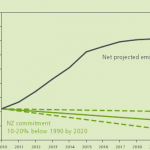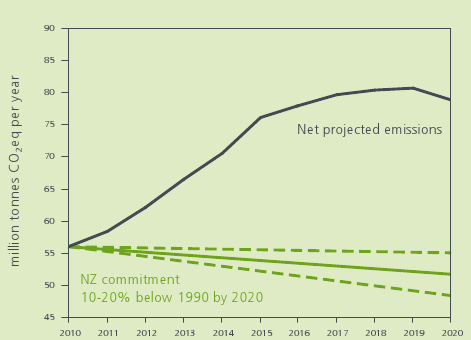
Is Tim Groser a Kyoto pariah? Or a Kyoto visonary? A global emissions reduction emissary or is he tar-sanded with a Canadian brush? I try to make sense of New Zealand’s double dealing and special pleading over the Kyoto Protocol second commitment period and the Doha climate change talks hooha.
I am very confused about New Zealand’s climate change policy since the Doha international climate change talks (COP18) and New Zealand’s announcement that it would opt out of a second period of the Kyoto Protocol back on 9 November 2012.
The Kyoto opt-out has been described as a shambles and a disgrace and as a lose-lose decision that shuts New Zealand out of the international carbon markets. Tim Groser’s Herald Op Ed today just confuses me more.
So I have a question for all Hot Topic readers.
If Minister of Climate Change Tim Groser is serious about New Zealand’s 2020 greenhouse gas target, why would he forego formally lodging the 2020 target into the existing Kyoto Protocol framework (where the national institutions and arrangements are already up and running), in favour of pledging to meet the target on a voluntary basis in terms of a yet to be negotiated treaty?
Let me break that question down into several parts.
- Imagine you are the Minister for Climate Change in the government of a small developed country.
- This small gutsy quirky country as well as having exported comedians like Rhys Darby has signed an international treaty with a few other nations which states a short-term national target for emissions of greenhouse gases.
- This nation enacts the treaty by creating some new institutions; a national register for emissions units, national inventories of GHG emissions, national surveys of afforestation, and public servants to report the predicted progress towards the national target.
- The nation has adopted several policies relying on the treaty institutions; an emissions trading scheme, forest sink schemes, research alliances, and international trading of emissions units.
- The nation has a second publicly stated medium-term target for greenhouse gas emissions for the years following the expiry of the first target. It is to reduce net emissions between 10 and 20% from the gross 1990 baseline.
If you are serious about that second emissions target, why would you pledge the target on a voluntary basis, when you could have formally lodged your target into an existing treaty (where the national institutions and arrangements have already been set up)?
Any answers? Anyone? Would you like to phone a friend?
Okay, here’s a hint. Tim Groser says in his op ed
“So is this a great time to put new costs on our major exporting industry when we have a huge need to increase our exports?”
and
“Our top priority is to strengthen the recovery in extremely difficult international economic times.”
Here’s another hint. The Parliamentary Commissioner for the Environment Dr Jan Wright has said that we are on track to exceed the 1990 emissions baseline by 30% rather than meet the 2020 target of reducing emissions by 10 to 20% compared to 1990.

Now just because New Zealand’s net emissions are likely to consistently increase through to 2020 doesn’t automatically mean New Zealand would not meet the 2020 target if translated into a Kyoto second commitment period target. We could just buy extra emissions units from the international Kyoto carbon markets.
That is, if there was a sensibly designed emissions trading scheme that passed the carbon price to emitters. Such a scheme would be 100% “emitter pays”, with emitters making their own market-based decisions to either reduce emissions or to buy the emissions units. Well we certainly don’t have that.
So my conclusion is that it is not just that Tim Groser has absolutely no intention doing anything domestically to achieve the 2020 target of a 10 to 20% reduction in GHGs.
Groser and National also have absolutely no intention of imposing any real carbon price on New Zealand’s industrial and agricultural emitters.

I agree it appears the govt has no intention of imposing a higher domestic carbon price than the international price.
The answer to your question was in your links.
The 10 – 20% target is conditional on a lot of pretty unattainable conditions, as you should have seen at the MfE webpage you linked. You should also have seen that there isn’t any target if those conditions are not met, from the beehive press release you linked to:
“The next decision will be to set a formal target for NZ’s future emissions track through to 2020 to sit alongside our conditional offer to reduce emissions between minus 10% and minus 20% below 1990 levels. “Cabinet has agreed in principle to set that target once we know exactly what the final rules will be on some crucial technical issues, including access to international carbon markets.” “
“I agree it appears the govt has no intention of imposing a higher domestic carbon price than the international price.”
Probably true password1, but you moved the goal posts from actually reducing emissions to playing around inside a bubble that as things stand has no useful outcome, where we’ve been all the time. So did you really agree with Mr February’s conclusions?
Noel
Your question is a little hard to understand.
I’ve already said that there doesn’t appear to be any political appetite for a higher NZ carbon price than the international price. The international price is a ‘real’ price for NZ businesses fully exposed to it, but it is not high enough for many people wanting to see domestic emission reductions instead of offshore mitigation (which is what international units represent).
Mr Feb constrains his conclusion to industrial and agricultural sectors, where current allocations and exemptions mean businesses in those sectors are protected from costs that their international competitors do not face. It’s obvious that the govt has no intention of improsing a ‘real’ carbon cost on those businesses, and the reasoning is obvious too. So yes, I agree with his conclusion.
password1,
Ok so you also see that the Government and Mr Groser are committed to the international carbon price setting the NZ carbon price.
That’s the status quo for NZ as a Kyoto Annex 1 country with an Annex B emissions target, isn’t it? That NZ’s connection to the international carbon markets is through signing on to Kyoto commitment periods.
So what’s your view on the Government and Tim Groser cutting the link (after 2015) to the international carbon markets (and therefore the international price) by opting out of the Kyoto second commitment period?
I find this all very ironic. E.g. there I was last month, in the “Mickey Mouse international units” post, criticising the Government for the linking of international carbon markets causing the NZ price decline. And arguing for a “NZ only” price approach. Then a month later, the Government, who say they want the internationally linked carbon price, take a major policy decision – opting out of Kyoto’s second period, that will completely cut NZ off from the international Kyoto carbon markets.
Mr Feb – I see the irony. I would be interested in the demand/supply projections of NZUs if international market access is lost (renegotiation of the rule is possible I guess). I suspect the Govt will simply sell lots of NZ units into the market if the price looks to go higher than is politically comfortable – as the govt was considering doing anyway to stop unit purchase capital being sent overseas.
Alternatively, perhaps linking with another ETS could be acheived and NZ firms be allowed to use those units for surrender. Hard to see that happening given significant ETS policy differences between NZ and Australia, EU, Korea, RGGI etc
No, the status quo is that the commitment NZ signed up to will expire following the 2015 square-up. The EU (which has huge benefits under Kyoto) has proposed a second period, but that has been declined by every non-European country with the sole exception of Australia.
Australia is a special case with unique political problems. It is currently paying about 6-8 times the international carbon price, and its announced way out of this mess is to join with the EU scheme in 2015.
New Zealand has taken a prominent role in UNFCCC negotiations to date and obviously wants to capitalise on its status. That would be wasted in the terminal side-street of Kyoto. Groser obviously wants to be a mainstream player on the track where the action is.
I consider that NZ ratifying Kyoto 2, even with a weak target, would help rather than hinder negotiations, especially if NZ is prominent in the talks. It would signal good faith per CBDR and NZ’s responsibility for historic emissions and economic development, would provide symbolic progress and stengthen our status in the talks, and would help link ETS policies, even if it would make no difference to global emissions and carry an economic cost to the Crown. I think the current position of the Govt is far from constructive and cannot see how it better helps the development of another treaty compared to Kyoto 2 and the Unfccc.
I can’t say I agree with much of that wild speculation, Australis.
As for mainstream players on action tracks, Tim Groser may be off to head the World Trade Org.